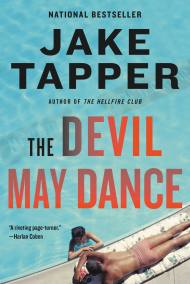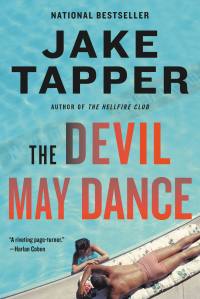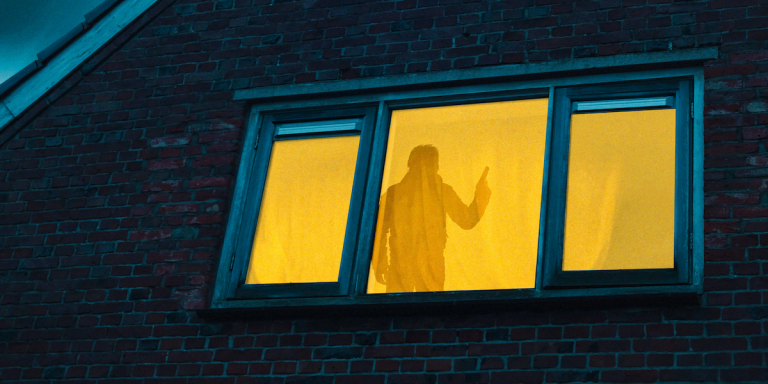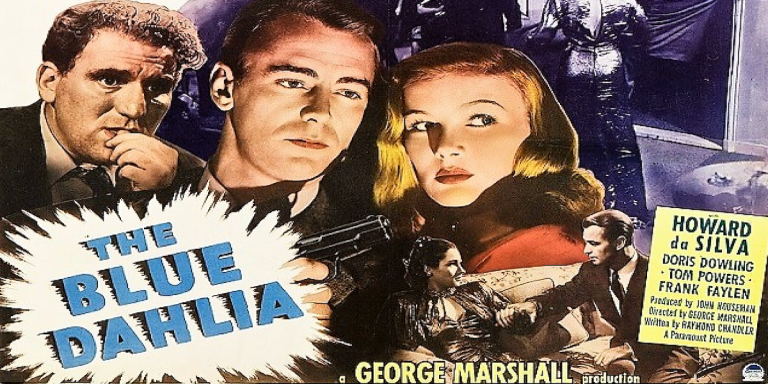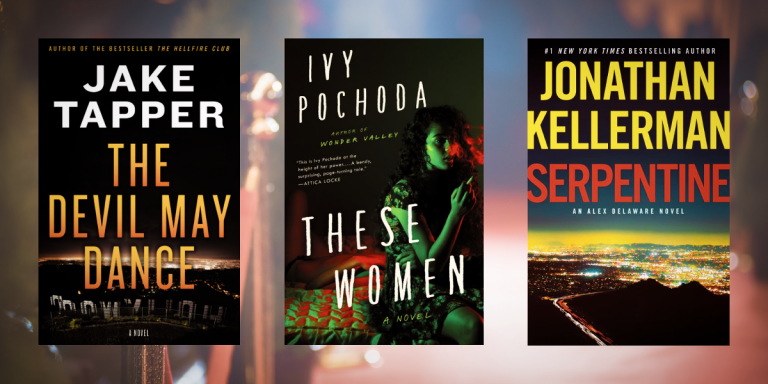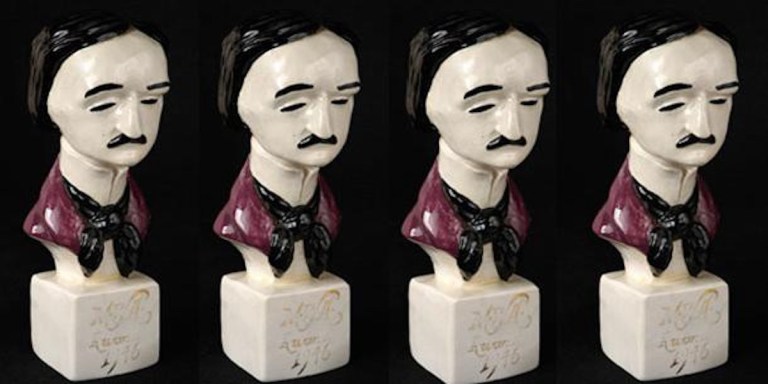Read the Excerpt: The Devil May Dance by Jake Tapper
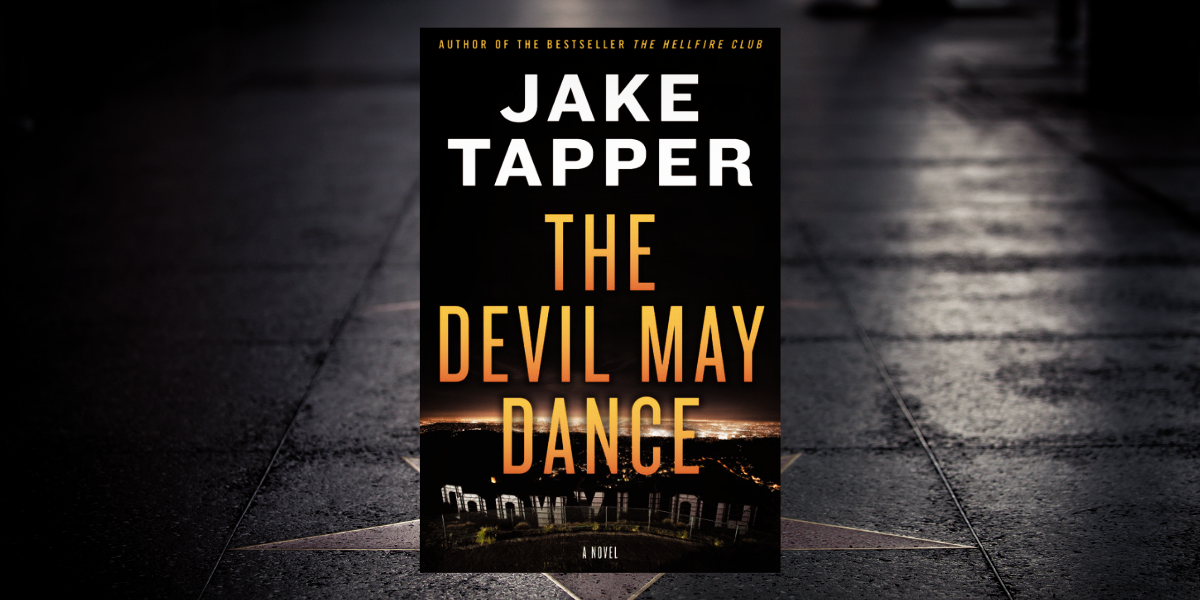
CHAPTER FOURTEEN
LOS ANGELES, CALIFORNIA
January 1962
“Dead bodies just happen to show up whenever you two are around,” Detective Meehan observed.
Margaret — exhausted after the long night of drinking and revelry followed by the shock and horror in the cemetery parking lot — rolled her eyes. “Didn’t a cop say that to Fred MacMurray in Double Indemnity?” she asked. “Your delivery was better, though,” she added with a broad and insincere smile. She had been shaken by the sight of poor Lola, but she was not about to allow herself to be bullied by this fraud.
Meehan snorted. “Pretty glib for someone with a corpse in her trunk.”
“Pretty glib for a cop who knows about the corpse only because we immediately called the police,” Margaret said, cool as November.
“Chris Powell was killed shortly after you came to town, and now there’s this doll,” he said. “I don’t want to tell my supervisors that you’re not being cooperative. There was a dead girl in your trunk, Mrs. Marder.”
“Dr. Marder,” she said quietly.
“Pardon?”
“Look,” she said, exhaling deeply, “we’re obviously horrified. We called and are cooperating, and we’ll tell you anything you need to know. Just spare me the film noir dialogue.”
It soon became clear to Meehan, though, that she didn’t know much. To Margaret, Lola Bridgewater was one of dozens of young women who flitted around the edges of Rat Pack parties. “The people you should be talking to are Mr. Sinatra and his pals,” she told Meehan. “Or her friend Judy. I barely knew Lola.”
“Why would anyone whack her?” Meehan asked.
Like half the locals Margaret had met since she arrived, Meehan acted as if there were a camera on him; he had all the scenery-chewing subtlety of Kirk Douglas. She thought momentarily of Bugs Bunny pretending to be Edward G. Robinson: Myah, see! It’ll be coytans for you, Mugsy! Coytans!
“I don’t know why anyone would kill Lola,” Margaret said. “Except perhaps to frame us, I suppose. As for who would do that, you’d have to ask my husband why we’re here, but it does involve law enforcement and top officials of the Justice Department, one of whom is on his way out here as we speak.”
Meehan’s hard-boiled facade broke for a second around the eyes and mouth; Margaret could see the revelation not only shocked but rattled him. She often saw this in men — they were offended when a woman stood up for herself. It would rankle them as if their very manhood were on the line. Then it would come out that she had some connection to powerful men — whether her husband the congressman or, in this case, the attorney general — and the men wouldn’t know what to do with their indignation.
“I need to . . . ” Meehan said. He hesitated, then abruptly left.
When Meehan entered Charlie’s interrogation room, he found the congressman at the table, his head buried in his arms, fast asleep. But he sat up as soon as Meehan walked in and delivered his “Dead bodies just happen to show up” line.
“Lola Bridgewater was her name,” Charlie said soberly. “Hor¬rible, horrible, horrible. We called you as soon as we found her.”
Meehan sat down across the table from Charlie and shook a cigarette out of his pack of Marlboros. “You don’t seem particularly distraught.”
Charlie stared at Meehan coldly. “I don’t know what that means. I didn’t know her well, but it’s very sad. We’re very upset, Margaret and me. As for my reaction to seeing a dead body, I wish I could tell you Lola’s was the first I’ve seen, but it isn’t. I fought in France.”
“Who do you think killed her?” Meehan asked after taking a long drag from his cigarette. He tilted his chair back on two legs and squinted through smoke at Charlie as if someone were filming them in black-and-white.
“I have no idea,” Charlie said, which was true. “An enemy of mine? An enemy of Frank’s?”
“The Mob?”
Charlie thought about it. “Maybe,” he said. “But why would the Mob want Lola dead? Why would they put her in my car? Seemingly to frame me — but again, why?”
“What have you done to piss them off?” Meehan asked.
Charlie paused. “I can’t really get into it in detail unless DOJ says I can, but I’m out here looking into some matters that might involve organized crime,” he said. “Maybe they figured that out.”
“Offing that chickie seems like pretty harsh retaliation for spying,” Meehan observed. “Unless they were trying to set you up, as you say. But then what? And why her?”
There was a knock at the door and Attorney General Robert Kennedy entered, with Addington White and Margaret in tow; Meehan gasped, then tried to pass it off as a cough.
“That’ll be all, Detective,” Kennedy said — Boston Irish trump¬ing LA flatfoot. Meehan scurried out the door without another word. Kennedy’s suit jacket was draped over his arm; his shirtsleeves were rolled up and his tie was loose. White, conversely, was as buttoned up as if he were walking into a baptism. Charlie rose to shake hands with them. They were the rats who’d gotten him into this fix, but he nevertheless was glad to see them.
“Let’s all have a seat, shall we?” Kennedy motioned to the small table. White lit a cigarette as Margaret reached for Charlie’s hand and gave it a squeeze.
“Glad you went to the police,” Kennedy said.
“We suspect we weren’t supposed to have found her body right then,” Margaret said. “We just happened to need something from the trunk.”
“I was sorry to hear about your father,” Charlie said to the attorney general, an awkward bit of courtesy given his own father’s status. Kennedy nodded.
“Makes more sense that whoever did this would have called in a tip and had the cops find the body,” White said. “Maybe at the hotel.”
“But who would do it?” Kennedy asked. “Who have you crossed out here? Giancana? Rosselli?”
“We haven’t crossed any of them,” Margaret said. “We’ve been as agreeable as a sloe gin fizz on a porch swing on a Sunday afternoon.”
“Giancana has a temper,” Kennedy noted. “He’s into revenge.”
“We were having dinner with Frank and Giancana and all the rest just hours ago,” Margaret told him.
“It’s possible I may have aroused their suspicions when I asked Sinatra’s valet to find out what favor Giancana needed from Frank,” Charlie said suddenly. “But I doubt the valet, George Jacobs, told anyone.”
“And did he tell you?” Kennedy asked.
“He did: Giancana asked Frank to get you to back off,” Charlie said. “Through the president, presumably. He was supposed to do it at Hyannis Port last fall, but George didn’t know if he went through with it. That’s it. That’s the whole scoop.”
Kennedy stared at him.
“Did he pass on the message?” Margaret wondered aloud.
Kennedy eyed her carefully, as if he were trying to figure out her motivation for asking. “Not to me. And the president would have told me.” He paused. “That’s interesting.”
Margaret found it odd that Kennedy called his brother “the president.”
“If I may, sir,” Charlie said, “Sinatra may not be educated, and too often he’s fueled entirely by impulse, but as a general rule, he’s very savvy. I’m sure he knew that asking either you or your brother would be a bridge too far.”
“I hate to even bring it up,” Margaret said. “But what about your father? Would Frank have asked him?”
Kennedy stared at her. It wasn’t clear if he was angry.
“I’m sorry for even — ”
“No, no, I’m thinking,” Kennedy said. “It’s fine. If he did talk to Father, I never heard anything about it.”
Kennedy looked down at the floor in sorrow; there hadn’t been much coverage in the news about how severe the stroke was, though initial reports suggested the patriarch was partially paralyzed and could not speak.
White jumped in to change the subject. “What did you find out about the other issue, about how mobbed up Sinatra is?” he asked.
Margaret eagerly followed his lead. “He’s got a lot of pals in organized crime,” she said, “and while we don’t know that any of their criminal acts have been done on his behalf, they’re around him quite a bit. In LA, in Vegas, in New Jersey . . . ” She turned to Charlie. “Were they with you in Rancho Mirage?”
“Rat Packers and groupies, but no mafiosi,” Charlie said.
“But that said,” Margaret continued, “as long as you’re serious about prosecuting organized crime, Charlie and I feel strongly that the president should not stay with Sinatra at Rancho Mirage. The association is unseemly.”
“We didn’t see any evidence that Sinatra is part of or knows of any criminal wrongdoing,” Charlie added. “But having the presi¬dent stay anywhere mobsters have likely also slept . . . I mean, for your political rivals, it would be like manna from heaven.”
Kennedy looked at White, who nodded.
“So you don’t think Sinatra would have had anyone take care of Chris Powell?” White asked.
“No,” Charlie said. “And not just because Powell wasn’t worth it. Sinatra cares about music, movies, gossip, politics, and women. I can’t imagine him ever actually asking for a hit.”
“Absolutely not,” Margaret agreed. “He’s not a murderer. Not even close.”
“Will you two step out for just a second?” Kennedy asked.
Margaret stood, but Charlie stayed in his chair. “We’re allowed to leave this room?” he asked.
“Congressman, I’m the chief law enforcement officer in the country,” the attorney general reminded him.
“You’re not going to be charged with anything,” White added.
Charlie stood and followed his wife out of the interrogation room and into the police office, which was abuzz with bookings from late-night Los Angeles life — prostitutes, thieves, fleeced tourists, all sitting at desks as weary officers tried to suss out copious claims. To Charlie’s keen nose, the room smelled of coffee, cheap perfume, and sex.
They paused in front of a bulletin board covered with public ser¬vice ads and departmental posters. ARE YOU INVITING BURGLARS INTO YOUR HOME? blared one flyer above a cartoon image of a house with its windows open. Another advertised the annual policeman’s ball. A third listed the “Qualities of a Good Policeman,” which included “the wisdom of Solomon,” “the strength of Samson,” and “the tolerance of the Carpenter of Nazareth.” A frayed pamphlet from the previous summer reminded officers to donate to the fund for slain Officer Sidney Riegel, c/o the Los Angeles Hillel Council.
Margaret sank wearily into a chair across from an empty desk. Charlie stayed on his feet.
“Think we can finally go home?” Margaret asked.
“Hope so,” Charlie said, looking around. No one was close enough to hear them. “But once the Feds have their claws in you . . .”
“What does that mean?” Margaret asked.
“We’re informants now, essentially,” Charlie said. “A higher class than the average Chicago stool pigeon, but the same basic job description. We work for them. For free.”
“Forever?” Margaret asked.
Charlie shrugged and turned his gaze toward a bulletin board.
Meehan abruptly appeared, grunted in their direction, and walked past Charlie to the door of the interrogation room. He knocked lightly; White opened the door and let him in.
Charlie raised an eyebrow at Margaret, then turned to look again at the bulletin board. The previous day’s “Daily Police Bulletin” was tacked in the middle of the board, with mug shots and finger¬prints of three arrestees: a white man picked up on four counts of forgery, a white woman in jail for four counts of petty theft, and a Black woman sporting a black eye who’d been picked up for issuing a check without sufficient funds. The charges all seemed remarkably small-bore to Charlie, especially given the dead woman in the trunk of his rental car.
He looked at Margaret; her arms were folded, and her eyes closed as her chin dipped toward her chest. He looked at his watch. Almost four a.m. Their night had started so long ago — dinner with Goode, drinks with the Rat Pack, then their ill-fated sojourn to Forest Lawn. He thought of poor Lola Bridgewater, a captured pawn in someone’s twisted game.
“Come back in, Congressman,” White said, snapping Charlie back to the present. Meehan brusquely passed him again, headed in the opposite direction. Charlie leaned over and lightly touched Margaret on the knee, startling her awake. She stood and he followed her back into the room; they both sat down at the table again.
“We want to know what you learned about Hubbard,” White said.
Margaret told them the story.
“Do you have the papers you grabbed from them?” White asked.
Margaret handed White the documents from her purse.
“What does it say, Addy?” Kennedy asked. He was facing the one-way glass, sleep deprivation noticeable in his voice.
“It’s titled ‘Project Celebrity,’ ” he said. “A list of celebrities they want to recruit. Winchell, Murrow, Dietrich.”
“A bunch of gossip columnists on there too,” Margaret added. “Parsons and Kilgallen. Hedda Hopper. Walter Lippmann.”
Kennedy turned around and cocked his head toward White. “I suppose nowadays gossip passes for news,” he said, holding out his hand for the document. Kennedy glanced at it for a few seconds, then folded it and put it in his inside jacket pocket. “What happened to the car you drove to the church?”
“We went back and got it the next night,” Charlie said, impressed with the attorney general’s attention to detail. “Took a cab to a spot five blocks away. No one saw us.”
“The same car you drove tonight?” Kennedy asked.
“Yes,” said Charlie. “It’s our rental car.”
Margaret didn’t think anyone from the church had seen them arrive, but who knew; they were a suspicious lot and the odds of surveillance weren’t negligible.
“You two can go back to the hotel and clean up,” Kennedy said. “Then around lunch I need you to sit down with Addington and give a full accounting of everything you’ve seen.”
“We’ve told you everything,” Margaret said.
“I’ll be the judge of that,” White said. “We want every last detail. Projects Sinatra is working on, the behavior of various Rats in the Pack.”
“Projects he’s working on?” Charlie said wearily. “There’s a screenplay about the U.S. accidentally dropping an A-bomb on North Carolina and covering it up.”
Kennedy and White looked at each other.
“Yes, all of that,” White said. “We’ll go over every detail.”
“And then we can go home?” Charlie said. “Back to New York.”
“You can go back east when production moves back east in a few weeks,” Kennedy said. “But until then, you need to figure out this Lola business.”
Charlie realized what Kennedy was saying. “Wait, you want us to figure out who’s framing us?”
“You’re in the best position to do it,” Kennedy said. “If it’s the Mob that did it — and that would be my theory — stick around to see what they do next.”
“Continue as a consultant to Manchurian Candidate,” White said. “There’s about five or six weeks of shooting left, Krim tells me. Soon some of it in New York, as you know. But you need to stay on this case until you figure out who killed the girl.”
Charlie sighed wearily. Defeated, deflated. Then he sat up in his seat. “We have an ask of you too, then.”
“Really?” Kennedy said, stunned. He wasn’t used to folks behind the eight ball trying to rack the table.
White jumped in. “Congressman, you’re really in no position — ”
“No, no, Addy,” Kennedy interrupted. “That’s fine, I want to hear what he has to say.”
“Margaret’s niece is in Los Angeles,” Charlie explained. “Violet. She’s underage. A runaway. And we saw her briefly with a much older studio executive. We’ve been asking around about her, to no avail.”
“And you’d like the FBI’s help,” Kennedy surmised.
“Actually, I have some information for you about your niece,” White said, reaching into his briefcase. He opened a folder that held a typed report. “I did follow up on that note from last time we met. We found her last known address,” White said, reviewing the case memo. “Violet isn’t there anymore. Nor is she in the company of Itchy Meyer, or at least, she hasn’t been seen with him in the past few weeks, according to our eyes and ears. Meyer says he met her for the first time that night and hasn’t seen her since. The landlady where Violet briefly had a room says she fell in with a fast crowd of party girls. That’s all we got.” He closed the file.
“It’s not much,” said Margaret. She rubbed her left arm and her body tensed. She was worried about her niece and also irritated that no one other than Charlie seemed to take Violet’s disappearance seriously, as if she were just a feral kitten. Did young women die in Hollywood on a regular basis the way Chicagoans died in the freezing winds off Lake Michigan? She’d begun to think it was a specifically geographical phenomenon, but here was the FBI echoing the indifference. She was grateful for Charlie pushing the attorney general on Violet’s behalf. Her husband might be turning into a drunk, but he was still kind and decent.
“It’s not much, but it’s more than you had,” Kennedy pointed out.
“We need more,” Charlie said. “You need to keep looking. If we’re going to stay in LA, you have to help us find her.”
“She’s a child,” Margaret said.
“Addington will see what he can do,” Kennedy said.
“Just a few other things before you go back to your hotel,” White added. “Your dad has been transferred from the Tombs.”
“Why?” Charlie asked. He looked at his wife, who was frowning.
“To where?” she asked.
“Sing Sing,” White said. “We had to get him out of the city while this is all going on. There were threats on his life. But don’t worry, he’s safe.”
Charlie found himself gasping, he was so stunned. “Why don’t I believe you?”
White looked at Kennedy. Neither one cared. Kennedy put his suit jacket back on. “Find out who the girl was with before she showed up in the trunk of your car,” Kennedy said. “Figure out who killed her.”
“I don’t even know who this Lola Bridgewater is,” Charlie said, about ready to fall apart.
“Well, apparently she was Mary Bechmann, from Minot, North Dakota,” said White.
“And Mary Bechmann from Minot, North Dakota,” Kennedy added, “had only just turned sixteen.”
Order The Book
Charlie and Margaret Marder, political stars in 1960s Washington DC, know all too well how the tangled web of power in the nation's capital can operate. But while they long to settle into the comforts of home, Attorney General Robert Kennedy has other plans. He needs them to look into a potential threat not only to the presidency, but to the security of the United States itself.
Charlie and Margaret quickly find themselves on a flight to sunny Los Angeles, where they’ll face off against a dazzling world of stars and studios. At the center of their investigation is Frank Sinatra, a close friend of President John F. Kennedy and a rumored mob crony, whom Charlie and Margaret must befriend to get the inside scoop. But in a town built on illusions, where friends and foes all look alike, nothing is easy, and drinks by the pool at the Sands and late-night adventures with the Rat Pack soon lead to a body in the trunk of their car. Before they know it, Charlie and Margaret are being pursued by sinister forces from Hollywood’s stages to the newly founded Church of Scientology, facing off against the darkest and most secret side of Hollywood’s power.
By clicking 'Sign Up,' I acknowledge that I have read and agree to Hachette Book Group’s Privacy Policy and Terms of Use
